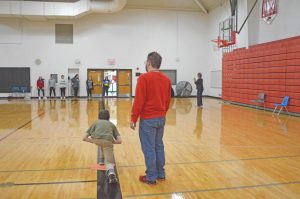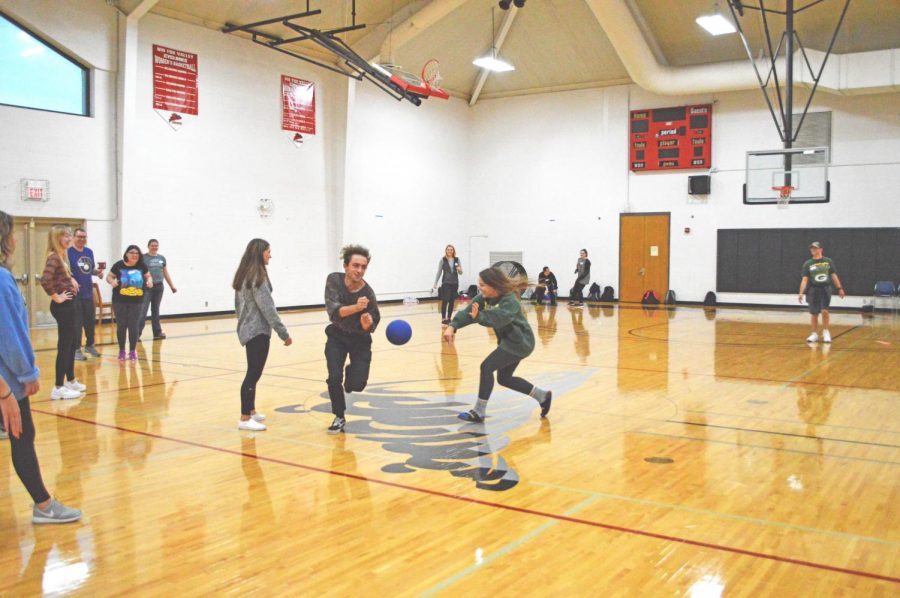Students give back through volunteering
UWO-FC students enrolled in a service learning course play kickball with students from Thrive Career Academy
October 10, 2019
Privilege, bias, discrimination and prejudice have been hot topics nationally and locally in recent years, and one UW professor has taken a unique approach to teaching her students about these issues.
Professor Tammy Ladwig is a teacher “teaching teachers to be teachers.”
Ladwig instructs a course at both UWO-Fox Cities and UWO-Fond du Lac called Education in a Pluralistic Society primarily taken by education majors. The course is a service learning and distance learning course with Ladwig alternating between the two campus locations and appearing via monitor to the satellite campus.
But Ladwig’s course isn’t your typical lecture and exam-based class. One of the course requirements is for students to spend 15 hours volunteering in the community.
The students volunteer at locations within the Fond du Lac and Fox Cities communities including BEAMING Equine-Assisted Therapeutic Riding, St. Joseph Food Program, the Community Clothes Closet, Habitat for Humanity, at humane societies, local school districts and more.
Although the majority of volunteer hours take place outside of class time, Ladwig also dedicates some class time to volunteering and participates alongside her students.
Last Thursday, Ladwig’s UWO-FDL class attended a conference on special education at Ripon College while her UWO-FC class played kickball with students from Thrive Career Academy, a program offered at UWO-FC that helps individuals with disabilities learn job skills and obtain employment within the community.
But how does playing kickball help UW students understand privilege, bias, discrimination and prejudice?
By allowing UW students to work with people who are disenfranchised, Ladwig’s course teaches understanding, empathy and compassion.
“The university students and the Thrive students all grow together. They get a hands-on, eye-opening experience in how much we’re alike,” she said.
Thrive Academy instructor Monica Allaback said the partnership between Ladwig’s class and the Thrive students allows them to “work with a population they may not be able to work with, and that opens their eyes — both UW students and Thrive students.”

A Thrive Career Academy student gets ready to steal a base.
Allaback said it gets the Thrive students “comfortable talking with other people, gets them better able to communicate” and adds camaraderie in the class and on campus.
UWO-FC student Helen Zalas said the partnership with Thrive has been a positive experience for the class.
“Just doing activities together is so big for them and so good for us … and it’s good to be involved,” Zalas said. “The reward is being able to make a difference and they make you happy when you’re doing this.”
UWO-FC student Tom Russell said working with the Thrive students helps the students feel accepted.
“This is a pluralistic society class so [we’re] trying to be more aware of the differences of people,” he said. Russell said he specifically seeks out classes Ladwig teaches because she has a different teaching style.
“Seeing a different perspective in the way she teaches opens my eyes to a more diverse thought pattern,” Russell said.
Ladwig said some of her students initially look uncomfortable when they learn they will be working with diverse populations who may have disabilities.
“I’m upfront about it; it’s in the syllabus. You are going to be uncomfortable at times,” Ladwig said. She added the individuals her class works with are often disenfranchised, picked on and isolated.
“How can somebody in the class who might be a role model bridge that gap and work through that with the students?” she said.
Some of her former students have developed lasting relationships with the Thrive students.
“I have students from UW Oshkosh that come back and work with the Thrive students once a week,” she said.
Ladwig said the purpose of her class is to give perspective to discrimination, prejudice and bias.
“Diversity is not just a black and white issue; it’s an issue of so many things,” she said. “The diversity of socioeconomic status; putting them with these people.”
Students also work with St. Joseph Food Program, which is located across the street from UWO-FC and serves more than 650 families per week.
“They are working poor, lower socioeconomic status,” Ladwig said. “So what does that mean? What does that look like? What does that bring? What obstacles might they have that we don’t have? What obstacles can we maybe help them with?”
Ladwig said she wants her students to be less judgmental and more open to learning how they can help others since they may someday play an influential part in educating our youth.
Prior to becoming a professor, Ladwig was a school teacher and said some of her students experienced food insecurity.
“I knew there were kids going home to no food, to nothing,” she said. “So we would box up food and we’d give the kids food to take home. What does it mean to be food insecure? What does it mean when you can’t just go to the refrigerator and eat something nutritious?”
One of the programs offered through St. Joseph Food Program provides meals to area school children.
“Every Friday they have a representative from the school who gets these boxes for these kids so that when they go home they can have something to eat,” she said. “Seeing that, and being able to be part of that, putting those boxes together, what that means. This is a real thing. And then what can I do to contribute so that perhaps somebody isn’t food insecure or so that I can lend a helping hand.”
Ladwig said the importance of getting students out into the community, working with diverse populations and volunteering cannot be underestimated.
“It gives you a perspective of perhaps where you might be able to serve your college better,” she said. “You are college students. You have a responsibility to take your knowledge and your ableism and give back through your ability, your intellect, your empathy [and] your compassion to help build better, stronger communities.”














